They Said It Couldn’t Happen, But After a Series of Unseen Global Evaluations, One American College Marching Band Quietly Rose to the Top — Now the World Is Scrambling to Understand How Auburn Just Redefined Musical Supremacy Overnight
In a world dominated by orchestras from Vienna, Tokyo’s symphonic precision, and London’s brass brilliance, few would have ever imagined that musical supremacy in 2025 would come not from a classical hall in Europe or an avant-garde studio in Asia — but from the sun-drenched fields of Auburn, Alabama.
And yet, here we are.
Against all expectations — and under the radar of most global analysts — the Auburn University Marching Band has just done the unthinkable: clinched the top spot in a secretive, invitation-only series of international performance evaluations that brought together elite musical institutions from across the globe. With breathtaking precision, bold arrangements, and emotionally charged storytelling, Auburn didn’t just participate. They redefined the standard.
The Secret Contest That Shook the Music World
For months, whispers of a “shadow circuit” of global evaluations had circulated in elite musical circles. Organized by the World Performing Arts Federation — a coalition of composers, conductors, and cultural critics from over 40 countries — the evaluations were held in various undisclosed locations, from hidden theaters in Rome to open-air amphitheaters in Seoul.
Each performance was assessed without bias, using blind reviews and strict scoring on musical complexity, innovation, choreography, audience engagement, and cultural resonance.
Out of 156 ensembles evaluated — from European conservatories, royal military bands, and renowned East Asian schools — one stood above them all: Auburn University’s Marching Band, affectionately known as the “Pride of Auburn.”
How Did a College Marching Band Outsmart the Giants?
What made Auburn’s rise so shocking wasn’t just who they beat — it was how they did it.
While many ensembles leaned on tradition and technical prowess, Auburn took a different route. They merged marching precision with theatrical storytelling, creating a breathtaking performance titled “Echoes of Liberty” — a powerful, soul-stirring journey through American musical history, cultural resilience, and unity.
The show blended jazz, gospel, military cadences, hip-hop percussion, and Appalachian folk in a seamless 12-minute masterpiece — capped with a rendition of “America the Beautiful” that left even stoic judges in tears.
Their use of dynamic formations, synchronized drone visuals, and culturally sensitive motifs wasn’t just innovative — it was revolutionary.
“We weren’t trying to win,” said Dr. Corey Spurlin, Director of the Auburn Marching Band. “We were trying to tell our story. Our history. Our truth. I guess the world heard us louder than we expected.”
The Internet Reacts: From Viral Clips to Cultural Frenzy
Once word of Auburn’s win broke, the internet erupted. Within hours, performance clips leaked onto social media — and what began as a buzz in band forums became a cultural tidal wave.
On X (formerly Twitter), “Auburn Band” trended globally. TikTokers began reacting to the show’s emotional finale. Music historians dissected the composition’s structure, while cultural commentators praised its bold inclusivity.
“This isn’t just a marching band show,” tweeted British conductor Lydia Hawthorne. “It’s a statement. Auburn has just raised the bar for what performance art means in the 21st century.”
By the end of the weekend, the full performance had surpassed 20 million views on YouTube, and global media from Tokyo to London were scrambling to secure interviews with the team behind the masterpiece.
More Than Music: A Moment for American Cultural Identity
In a time where the U.S. has often faced cultural critique on the world stage, Auburn’s win became symbolic — a testament to what can happen when local passion meets national pride and global artistic standards.
President Joe Biden personally congratulated the team via social media, calling their performance “a reminder of America’s heart, soul, and unmatched creativity.” Even celebrities like Beyoncé and Lin-Manuel Miranda shared clips, applauding the band’s cultural artistry and message.
What’s Next for the Pride of Auburn?
International invitations have already started pouring in. Rumors suggest the band may perform at the 2026 Summer Olympics opening ceremony in Tokyo. UNESCO has reached out for collaboration on a cultural preservation project, and music schools across the country are requesting Auburn’s show for academic study.
Still, back in Auburn, the band remains grounded.
“We’re just students who love to play,” said senior drum major Tiana Ellis. “We practiced in the heat, rehearsed late nights, and supported each other like family. That’s what made this possible.”
Auburn’s Legacy Begins Now
They said it couldn’t happen.
They said a college band couldn’t compete with the world’s best.
They said America had lost its musical edge.
They were wrong.
With heart, harmony, and hustle, Auburn University’s Marching Band has not only stunned the world — they’ve redefined it.
And somewhere, as the echoes of “Echoes of Liberty” fade across stadiums and screens, a new standard has been set — not by legacy, but by passion.





























